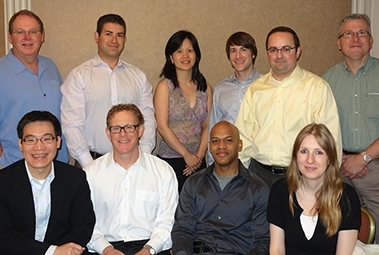
From top left to right: Drs. Timothy Boone (TMH), Jorge Darcourt (TMH), Gloria Chiang (WCMC), Andrew Avarbock (WCMC), Jonathan Zippin (WCMC) and John Leonard (WCMC). From bottom left to right: Drs. Chun Lin (TMH), Eric Bernicker (TMH), Carl Crawford (WCMC), and Halina White WCMC).
It happened suddenly and without warning, and there was little Dr. Andrew Avarbock could do.
One of his patients had sprouted a blistering skin rash after taking a medication — a reaction that can often be fatal.
Dr. Avarbock, a dermatologist at Weill Cornell Medical College, was a resident when he first witnessed the devastation that severe cutaneous drug eruptions can cause - and he never forgot it. Rather than accept the few ineffectual tools in the doctor's treatment chest, he was determined to understand the causes of the reaction to develop better treatments. There was only one snag in his plan: In the hustle and bustle of residency, Dr. Avarbock had never learned how to conduct clinical research.
Now Dr. Avarbock is getting his chance. Weill Cornell Medical College and Houston Methodist Hospital have joined forces to offer an accelerated clinical research training program to junior faculty like him who are interested in conducting clinical trials. Dr. Avarbock is one of eight faculty —five from Weill Cornell, three from Methodist — who are participating in the program.
"I wanted to use some of what I now know in my clinical exposures here and during residency and apply research to these clinical circumstances," said Dr. Avarbock, an assistant professor of dermatology at Weill Cornell. "I've had research experience in basic science, but have never done clinical research. Now I'm just trying to merge the two together."
The collaborative initiative, the Mentored Clinical Research Training Program, provides one year of professional development to early-career physicians at both institutions who want to participate in clinical research trials but are too busy for a comprehensive training program that typically lasts two years.
"This new program seeks to fill a gap in the available training resources at Weill Cornell and Houston Methodist, while drawing more physicians into clinical research," said program Director Dr. John Leonard, associate dean of clinical research, vice chairman for clinical research in the Department of Medicine, the Richard T. Silver Distinguished Professor of Hematology and Medical Oncology and director of the Joint Clinical Trials Office at Weill Cornell and NewYork-Presbyterian Hospital.
Physicians who want to conduct clinical trials must understand study design, epidemiology, biostatistics and regulatory procedures. Having expertise in conducting clinical trials benefits patients by advancing treatments and therapies. It's also a boon to academic medical centers, since clinical trials reflect the institutions' translational medicine missions and bring in grant money and other funding.
But residency and fellowship programs often offer little exposure to clinical research, making supplemental training during scientific and clinical practice unusual.
"If you don't know anything about statistics and how to power a study you might end up with worthless data, or maybe you should be doing a registration trial and not a clinical trial," said Dr. Timothy Boone, co-director of the Institute for Academic Medicine and chairman of the Department of Urology at Houston Methodist, and professor of urology at Weill Cornell. "The training allows you to pose your clinical question and answer that question with planning and foresight."
The Clinical and Translational Science Center at Weill Cornell solicited applications from physicians who finished their residency or fellowship training within the last seven years, and in May notified faculty of their selection. The program began July 17 with a four-day workshop at the Cornell Club in New York City.
The workshop featured didactic coursework, small-group sessions and invited speakers. It also provided faculty with an introduction or refresher to the foundations of clinical research, including research design and methodologies, data management and analysis, and the regulatory process. Over the next year, each of the faculty will develop and conduct a clinical research trial, receiving mentorship and guidance from more experienced clinical researchers at Weill Cornell and Houston Methodist.
"This was a phenomenal experience that kick-started my project, got me thinking critically about quantifying the limitations and got me strong practical help toward my first mentored grant," said Dr. Chun Lin, assistant professor of cardiology at Houston Methodist and assistant professor of medicine at Weill Cornell.
Dr. Lin will develop a study to examine the prognosis and risk stratification of patients with adult congenital heart disease using cardiac MRI. Patients with the condition were born with a heart defect that in the past would have been fatal during childhood, but advances in medical care have allowed them to live into adulthood.
Building a Bridge Between the North and South
Since Weill Cornell and Houston Methodist began their affiliation in 2004, leaders at the two institutions have searched for opportunities to shrink the distance between New York and Houston.
One way was to encourage junior faculty to develop joint clinical research trials. While Dr. Leonard had an already-established 2-year clinical research training program at Weill Cornell, he and Dr. Boone worked together to condense the material into one year.
Dr. Michael G. Stewart, vice dean, the E. Darracott Vaughn, Jr., M.D. Senior Associate Dean for Clinical Affairs and chairman of the Department of Otolaryngology at Weill Cornell, lauded the program for fostering collaboration and sharing knowledge between the two institutions and helping young physicians become productive clinical researchers.
"The Mentored Clinical Research Training Program is an exciting venture for Weill Cornell and Houston Methodist that builds upon our thriving partnership to provide critical insight and growth for our faculty," said Dr. Stewart, who is also professor of otolaryngology and public health at Weill Cornell. "It will not only enhance the bridge we built nearly 10 years ago between the North and South, but also advance treatments and therapies we can offer our patients."
